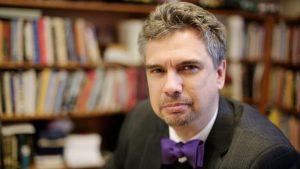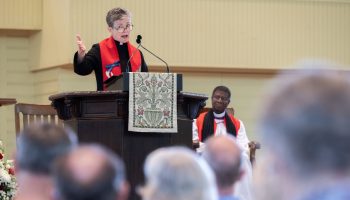Jesus spoke more about money than any other topic — more than the Kingdom of God, more than sexuality,” Miguel A. De La Torre said at the 9:15 a.m. Thursday Ecumenical Service in the Amphitheater.
His sermon title was “What Must I do to Inherit Eternal Life?” and the Scripture readings were Luke 18:18-23, the rich young ruler, and Luke 19:1-10, Zacchaeus’ encounter with Jesus.

“Very few people hear sermons about money, but the Kingdom of God belongs to the poor, and the rich won’t enter without a recommendation letter from the poor,” De La Torre said.
The person who decided to build extra barns would be called a wise businessman or woman, he said.
“We would put him on our company board because he knows how to strategize for the future,” he said. “But Jesus called him a fool.”
In the story of the rich man and Lazarus, the rich man goes to hell while Lazarus rests in the bosom of Abraham.
“There is no link in the story to say the rich man caused Lazarus’ poverty,” De La Torre said. “The rich man is condemned for his riches and for not recognizing the poor. We have created a theology that allows us to enjoy our riches and not be guilty about it. We say we have riches because God is blessing us. We think God is blessing us because we have a car, a house, a job and income. Does that mean that people who have known hunger, who have no roof over their heads, are not blessed by God?”
De La Torre continued, “When we confuse blessings with riches, we leave out a lot of poor people of color. We think we are blessed because we know how to work harder or smarter or better. Does that mean that these people do not work harder or smarter?”
Those in power tend to tell the poor that they have to listen to a sermon that tells them about the love of Jesus, and accept him as their savior so that they will not be poor.
“When I was a pastor, if a rich man had come to my congregation, I would have been tempted to think of the new fellowship hall we needed,” De La Torre said. “I might have said to him, accept Jesus as your savior, come to church, tithe and maybe become head of the deacon board. But Jesus said to sell everything and give it to the poor. We try to save Jesus from Jesus and interpret that passage so we don’t have to do it. We say, ‘Jesus didn’t mean for all of us to sell everything, it is just for the sin of this person. All we have to do is sell what gets in our way.’ ”
Everywhere else in Scripture, De La Torre said, “we try to take literally what Jesus said to do — except here. If we have two coats, we sell one. But we do not give up resources so that more people can enjoy the fruits of this world.”
If everyone on Earth consumed resources like the United States, “we would need four planet Earths for the whole world to enjoy our standard of living,” he said.
The irony is that in a world where hunger is the constant companion of many, in the United States, people spend millions trying to lose weight.
“We need the largest military in the world so that the largest share of resources goes to 6% of the world’s population,” De La Torre said. “The next 14 richest countries together don’t have the military budget that we do.”
The writer of Luke knew that the readers of the Gospel would try to soften and explain away what Jesus said. Luke put stories back to back — the first story to show what Jesus said, and the second to reinforce what he meant. After the story of the rich young ruler, Luke positioned the story of Zacchaeus.
Zacchaeus was a tax collector, the equivalent of a pimp or pornographer.
“He was abusing his own people for the sake of money,” De La Torre said. “No good Christian would eat under his roof, but Jesus did.”
In the presence of Jesus, Zacchaeus said he would give half of his wealth to the poor, and if he had cheated anyone, he would repay them four times.
“Did Jesus say, ‘No, that’s OK, you don’t need to do that’? ” De La Torre asked. “Jesus links salvation with what we do with the poor. He said, ‘Today, salvation has entered this house.’ ”
Salvation means liberation from individual sin and corporate sin, from sin imposed by us on others and sins imposed by others on us, he said.
“Eurocentric thought is hyper-individualized,” De La Torre said. “In the Hebrew Bible, salvation comes to the people. What if I got to heaven only to see my family all in hell? That would not be heaven. We have lost our sense of communal salvation. If the Lord returns and judges Chautauqua as a people, how will we come out as individuals and as a community?”
De La Torre said, tongue in cheek, that he knows he has a mansion in heaven. But what if there is no heaven? he asked. What if this is all there is?
“If we believe that our reward is in heaven, is our work with the marginalized so we can get a ruby in our crown? Is that investing in heaven?” he asked.
De La Torre said he is becoming less concerned about eternal life.
“I do what I do because it defines my humanity, my faith, and brings me liberation of my psyche, soul, spirit, body and humanity,” he said. “I am liberated by what I am doing, not by a doctrine or a reward after I die. My actions are an outward manifestation of what has occurred in my soul. Show your fruits, and if the tree is not bearing fruit, it will be cut if down and thrown in the fire.”
The Rev. Susan McKee presided. Welling Hall, recently retired as Plowshares Professor of Peace Studies at Earlham College, read the Scripture. Her great-grandfather sold ice cream at the first Chautauqua Assembly in 1874, and her grandfather, Henry Smith Leiper, served as director of the Department of Religion from 1959 to 1967. The Introit, sung by the Motet Choir, was “May the Words of Our Mouths,” by John Ness Beck. The anthem, also sung by the Motet Choir, was “O Inexpressible Mystery,” by Tawnie Olson. James Cunningham, a former member of the Pittsburgh Youth Orchestra and a rising junior at the University of Michigan, accompanied the choir on the viola. Jared Jacobsen, organist and coordinator of worship and sacred music, played the Massey Memorial Organ. Thanks to several generous Chautauquans, braille worship books and hymnals are available for the sight-impaired. They are available at Gate 4, the Ralph C. Sheldon Foundation Gate. Ask any usher for assistance. The Daney-Holden Memorial Chaplaincy and the John William Tyrrell Endowment for Religion provide support for this week’s services.




